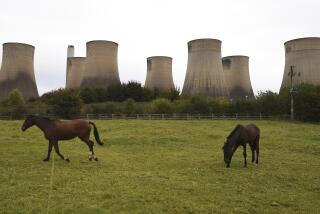British Government Wins Close Vote on Closing Mines
- Share via
LONDON — The British government narrowly survived a protest vote Wednesday night in Parliament over the mines-closure issue, as thousands of miners traveled to the capital trying to save the country’s coal industry.
After a long and stormy session in the House of Commons, Conservative Party lawmakers defeated by just 13 votes, 320 to 307, a measure from the opposition Labor Party to halt all pit closings.
The government also won a second vote on a Conservative amendment on the mines issue, 320 to 305.
After the vote, Prime Minister John Major said: “It was a satisfactory win. It was a clear margin.”
The balloting came as the latest MORI public opinion poll showed Major with the lowest popularity of any British head of government in the postwar period; only 16% of those surveyed expressed confidence in his leadership.
The debate in Parliament was one of the most fractious in years, with Cabinet minister Michael Heseltine carrying the burden of the government’s argument--and being frequently interrupted and even howled down.
Heseltine was in the unfortunate position of having to justify government mine-closure policy to members of his own party questioning him from the back benches.
Heseltine pledged a “detailed and genuine review” of the future of the 21 threatened coal pits, and he raised a glimmer of hope among miners that 10 other mines targeted for shutdown might escape being closed.
Miners, marching through the streets and parks of London, were applauded by shoppers, office workers and tourists during their peaceful demonstration, the largest in years.
Traffic in much of central London was tied up by chanting miners who called out, “Coal not dole!” and carried placards urging: “Sack Major Not the Miners.”
The miners, obviously supported by wide segments of the public, were attempting to reverse a decision by Board of Trade President Heseltine, who is also secretary of trade and industry, to shut 31 coal pits and lay off 30,000 miners, or about three-quarters of the mining work force.
Heseltine and the government-owned Coal Board maintain that Britain’s mines produce more coal than customers--mainly power plants--will buy.
But the miners and their supporters say that power from the gas-fired power plants will ultimately be more expensive than coal-produced electricity when natural gas gets more expensive.
During the week, Heseltine backtracked on the government’s coal position, and in the parliamentary debate Wednesday pledged to review those mines slated for closure.
Dozens of mining towns--mainly in the hard-pressed English north--face the prospect of ceasing to function as communities because they are so dependent on the mines.
Wednesday, at least 30,000 marchers set off before dawn in fleets of chartered buses and hired trains for the huge mass protest, which police said was “all very peaceful.”
The marchers were led by National Union of Mineworkers President Arthur Scargill, escorted by senior police officers, in a serious but well-behaved demonstration.
One miner marching with a union mine-rescue group said: “We’re not here for trouble. We’re here for a demonstration.”
Meanwhile, a small bomb, for which the Irish Republican Army claimed responsibility, exploded on a commuter rail line in North London, causing damage to a passing train but no injuries.
The IRA said it had warned the police about the presence of the bomb, but that authorities took no action before the explosion.
Later, two other bombs went off in London, with minor injuries reported.
More to Read
Sign up for Essential California
The most important California stories and recommendations in your inbox every morning.
You may occasionally receive promotional content from the Los Angeles Times.













